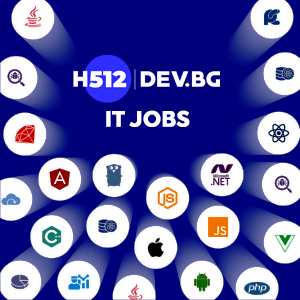The AI buzz in Bulgaria is getting bigger and bigger, not only because of the possibilities of ChatGPT, Copilot and Perplexity. AI ideas, tech talent and scientific progress are already moving the country forward (even before the soar of AI models), making it a good place for investments and business.
Had you dug deeper into the details of Bulgaria’s AI opportunities? Do you know IT specialists in the country are already familiar with what artificial intelligence has for them, both for coding and entrepreneurship? And researchers are not falling behind, either.
Let’s jump into some of the facts.
Bulgaria has its own AI institute
The Institute for Computer Science, Artificial Intelligence and Technology (INSAIT) is a special unit of Sofia University, the biggest university in the country. It’s supported by ETH Zurich and EPFL in Lausanne, two of the leading academic institutions in Europe, both based in Switzerland.
INSAIT was founded in April 2022, with a nearly 100 million euros investment, mostly by the Bulgarian government (almost €87 million for ten years), but also by private tech companies, such as Amazon Web Services ($3.8 million), DeepMind ($285 000), Google ($3 million), SiteGround (nearly $7 million) and VMware ($1.5 million).
The founder, Prof. Martin Vechev, and his team developed BgGPT – the first open AI language model adapted to use Bulgarian language. Prof. Vechev is also a co-founder of LatticeFlow that develops next-gen AI, with the U.S. army and Siemens already being some of its first clients. The startup is on a mission to empower companies to build and deploy trustworthy AI. And it has secured nearly $12 million investment back in 2022.
INSAIT attracts young tech talents from all over the world through its research programs and fellowships. And it already sealed numerous partnerships, including with the Bulgarian defence ministry.
Last December, a joint team from INSAIT and ETH Zurich founded LogicStarAI. The company has an AI agent that manages bug fixes for tech teams.
The institute is a member of the global AI Alliance, among AMD, IBM, Intel, Meta and Oracle.
And that’s far from all… An AI factory will open in Bulgaria by the end of the decade
One out of thirteen European factories will be located in Sofia Tech Park, which puts Bulgaria’s AI talents on top EU level, among countries like Austria, Germany, Italy, France and Spain. €90 million would be invested in this project, led by the European High-Performace Computing Joint Undertaking (EuroHPC JU).
The BRAIN++ factory (Bulgarian Robotic and AI Nexus) will be a one-stop shop for public institutions, educational organisations and private companies to innovate and adopt AI, once it opens its doors by 2029. The facility would also be hosting the Discoverer++ supercomputer tailored for advanced AI workloads.
One of the factory’s main aims is to promote Bulgaria as a regional leader in AI innovation. And this, according to INSAIT, can be achieved through talent development, more support for startups, deployment of Bulgarian LLMs, product manufacturing, etc.
Bulgarian AI minds, ideas and companies thrive, including across borders
This year’s Future of Jobs Report of the World Economic Forum showed that tech-related roles (including Big Data specialists, AI and ML specialists and fintech engineers) are the fastest-growing jobs in percentage terms, and AI and big data are some of the fastest-growing skills.
And whole business models are already built with AI in their core. Take Iris.ai as an example. The company was founded in 2015 and helps researchers and R&D centers browse through millions of scientific papers through search in seconds. This idea already brought the company nearly €10 million funding in two years.
AI companies operate in various industries – Transmetrics redefines logistics, fleet maintenance, trucking; Imagga Technologies develops an image recognition technology based on machine learning; Shemha Health uses AI to find better treatment for every cancer patient.
Some key players, such as Accenture and DataArt (both with offices in Bulgaria) work on AI solutions and implement new technologies in their work. And, according to the latest data from the Bulgarian Association of Software Companies (BASCOM), AI has been adopted by every software company in the country. This means that tech specialists here already know what AI can do to transform their work and make it more efficient. And they also know how to make successful business out of it.
Bulgarians also stay behind some well-developed products that succeed even beyond Bulgaria. LA-based Uvionix has AI-powered flying robots designed for warehouse navigation and inventory monitoring with almost 100% accuracy. Last year, the company secured $3.5 million seed funding to expand its activity and develop its product.
The AI community and interest is stronger and stronger
Bulgaria offers more and more events dedicated to artificial intelligence and its development. This is not just a way to stay up-to-date about the latest trends, but also an opportunity to connect with potential partners and peers.
In March, the first-ever AI Innovation Summit showed how to use the power of AI for content, marketing and research. On the other hand, speakers from DataCon Sofia 2025 (including Databricks and Google specialists) focused more on the future of data and AI infrastructure.
Explore more
And here’s a list with some of the AI events, coming up in 2025.
International Conference on Cybersecurity and AI-Based Systems, Sept. 1-4, Varna
The Cyber-AI 2025 Conference sheds light on artificial intelligence through one of the most important aspects of today’s world – cybersecurity. Researchers, professionals and innovators discuss how to build secure AI systems, how to withstand threats and how to collaborate with each other on this.
Ethical challenges and groundbreaking solutions in AI are also among the key topics. Hint: There are daily 50-minute direct flights from Sofia to Varna.
AI Industrial Summit Bulgaria, Sept. 13, Sofia Tech Park
This is an all-day event by Sofia Tech Park where speakers focus on how programming languages and solutions change with AI, what happens to privacy, data and to the software engineers in this environment. Among last year’s speakers were Marco dal Pino and Massimo Bonanni from Microsoft, tech specialists from EPAM Systems and Ocado Technology and Bosch Digital Bulgaria’s General Manager.
Sofia Tech Park also organises another annual event – Data Saturday Sofia will take place on Oct. 4 this year and will offer sessions about cloud, analytics, AI and more.
On the other hand, following the common trend, other tech events also focus on AI recently. Among them was Webit 2025 in June. The Web3 and Human-Centered AI Edition brought to Sofia people from various industries who want to see how artificial intelligence and new technologies impact our life, work and growth.


 Publish date: 21 August, 2025
Publish date: 21 August, 2025




